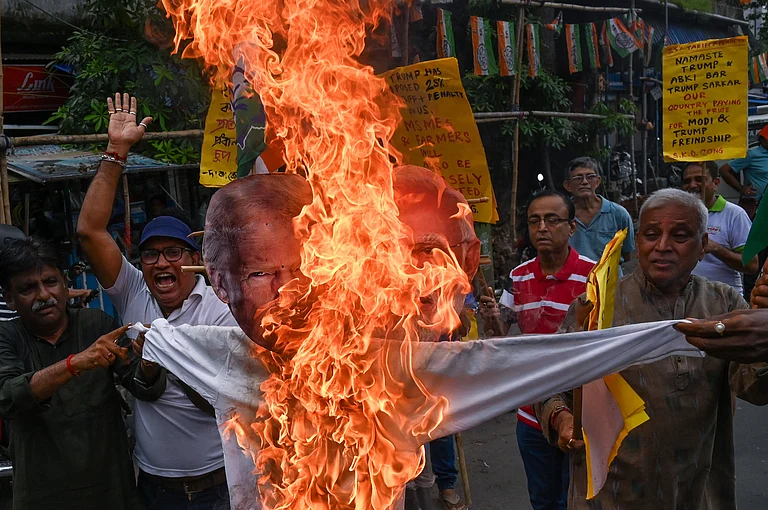With Jammu and Kashmir completing five years under central rule on Monday, the second-longest period of presidential rule in the country since Independence, former J&K Chief Minister Omar Abdullah said democracy ends where J&K begins.
“’Democracy is in our veins, it is in our culture’; ‘India is the mother of democracy’; ‘India is the temple of democracy’. Great sounding words that the international community lap up and regurgitate ad-nauseam. Meanwhile, J&K completes five years under central rule today. Democracy ends where J&K begins,” said Omar.
National Conference Spokesman Imran Nabi Dar said, “If the central rule continues, this second-longest stint of President’s Rule will soon become the longest ever. The first one was for five years and nine months between 1990 to 1996 when the situation was very volatile. Today, Government of India says J&K is normal, then what stops it from giving power back to the people of J&K.”
The BJP is all praise for the governor’s rule, saying in these five years Jammu and Kashmir has seen “unprecedented development” and progress and the central rule was necessary for the development.
“What we have seen is that administration is more concerned about the grievances of the people. However, now the time has come for holding assembly elections in Jammu and Kashmir and the BJP is for it,” said BJP Spokesman Manzoor Ahmad Bhat.
Bhat said even though people are happy with the Lieutenant Governor’s rule, elections are necessary for democracy.
On Sunday, Lieutenant Governor Manoj Sinha, in his monthly radio address ‘Awaam ki Awaaz’ said the present era is the golden period for J&K.
“We have to move forward unitedly and remove every hurdle on the path leading to the holistic development of Jammu Kashmir,” Sinha said.
Sinha said in both rural and urban areas there is a need to isolate the elements holding the J&K back, “so that the creative forces of the society can work as a cohesive group towards a shared goal of making India the new economic powerhouse of the world”.
Political analyst Zafar Choudhary argues that it is a Nehruvian legacy and every government at the Centre has adopted absolute political and administrative control over Jammu and Kashmir as a ‘conflict management’ strategy while denying the existence of any conflict.
He said, “Jawaharlal Nehru installed Ghulam Mohammad Bakshi to run Kashmir through proxy for 12 years. From 1965 to 1975, the Congress took direct control by renaming the plaint faction of National Conference. There have been 22 years of coalitions — 18 years of Congress with regional parties, three and half years of BJP with regional parties. For close to 14 years, the Centre —both Congress and BJP— have handled the affairs directly through Raj Bhawan. All said and done, if Delhi can’t lose control of Jammu and Kashmir, the Raj Bhawan approach is much better and honest than deceitful proxies made thrown at people as their leaders.”
However, PDP leader Naeem Akhtar says it is beyond “proxies”.
Akhtar said in the past five years, very serious attempts have been made to undo the previous seven centuries of the cultural and intellectual evolution of Kashmir. He said such attempts have no precedence even in the past 70 years and that taking away the land rights and jobs of the people is one part of it.
He said, “But the other part is not only invisiblisation of the local population but to replace it. Kashmir of course faces this threat of demographic change but unfortunately, the Hindu-dominated areas of Jammu are in the middle of the deluge. Before Kashmir, it is Dogra identity which is being diluted.”
Akhtar added that the strategic community of the country are well aware of the consequences of such experiments in the sensitive state of Jammu and Kashmir and its geostrategic implications for the country but they are not speaking up for obvious reasons. He said that given what is happening in Manipur, such experiments don’t bode well for “our country’s larger security goals especially when the country facing two hostile neighbours on its borders in J&K”.
Jammu and Kashmir has been without an assembly since November 2018 when the then legislative assembly was dissolved by then-Governor Satya Pal Malik after PDP leader Mehbooba Mufti staked claim to form the government.
The governor’s rule was imposed in J&K on June 19, 2018 after the BJP pulled out of the Mehbooba Mufti-led PDP-BJP coalition government.
On May 6 last year, Delimitation Commission finalised its two-year-long exercise and recommended the creation of six additional assembly constituencies in the Jammu region and one more in the Kashmir Valley. It was expected that the completion of the process of redrawing the electoral map of Jammu and Kashmir would pave the way for assembly elections in the Union Territory (UT).
But after the delimitation panel’s report, the Election Commission of India (ECI) started work on the revised voter list and completed it in November last year, publishing over 7 lakh new voters, taking the total number of voters in the UT to 83,59,771. Since then, the different political parties are pushing for the elections in Jammu and Kashmir.
On March 6, Farooq Abdullah led a delegation of all political parties to the ECI to press that it is under a constitutional obligation to hold assembly elections in Jammu and Kashmir. The delegation in its memorandum presented to the ECI in New Delhi said that the delay and denial of assembly elections in J&K would amount to a denial of the fundamental and democratic rights of the people of Jammu and Kashmir. The delegation said the assembly election would be the first and most important step towards the restoration of all the constitutional rights guaranteed in the constitution of India and the fulfilment of the political aspirations of the people of Jammu and Kashmir.


























